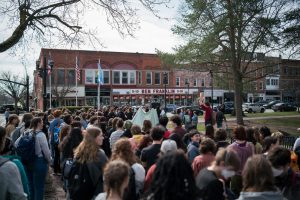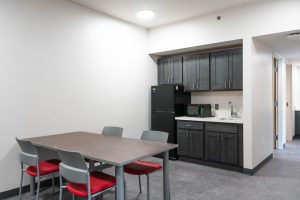Apollo Returns to Educate, Entertain
September 21, 2012
The Apollo Theatre has been hopping all summer, but the crew working on its massive renovation has kicked it into overdrive in the past few weeks in preparation for this weekend’s grand re-opening. Construction crews were dodging ladders and carts full of wood composite, while upstairs technicians were hurriedly attending to stacks of humming servers. Opening night was only two days away, and there was a lot of work to be done before the theater would be up and running. Nevertheless, Oberlin College Media Relations Director Scott Wargo just beamed at the work going on.
“I don’t usually use the word ‘unique’ to describe something,” Wargo said. “I don’t think people use it correctly in speech a lot of the time. But film screening, video production and editing, historical analysis and the ability to lay down scores… put all those things together, and I guarantee you won’t see that anywhere else.”
The Apollo’s marquee temporarily vacated its post, but it has been restored to welcome a new generation of Oberlin moviegoers, cinema students and enthusiasts.
He had a point. When it hosted its first screening two days later, on Thursday night, after a $6 million, yearlong renovation, the Apollo had become home to the Danny DeVito and Rhea Perlman Cinema Studies Center for Media Education and Production. The space featured a postproduction lab, a small recording studio and numerous other digital workstations for students in the Cinema Studies department. That’s not counting the redesigned, 417-seat main theater that features a 50-foot screen and a new 61-seat screening room on the first floor.
The downstairs area had been remodeled carefully so as to preserve its authentic look. Inside the main theater, the sides of the old seats had been repurposed to hold the new ones, and the refurbished red and white paneling on the walls, dating from the 1930s and discovered underneath wall coverings during the renovation, is reminiscent of the barber shop that used to occupy part of the building.
“It’s a lot more comfortable, very inviting,” Wargo said.
The updates are all in keeping with U.S. historic preservation guidelines, allowing the theater to sustain its nearly century-long history. Built in 1913 by William Hobbs, the theater opened to the public with a screening of the silent movie Thor, Lord of the Jungles. In 1928, it was bought by Jerry Steel, who ushered in a new era of technology by showing films with sound. The theater underwent a remodeling and in 1950 gained its characteristic marquee, which was given increased structural support and new panels in the current renovation.
Thursday night the Apollo tapped into that storied history and reopened with an invitation-only screening of Louis, a silent film that fictionalizes Louis Armstrong’s childhood and featured the Oberlin Jazz Ensemble playing Wynton Marsalis’s original score live. Next week’s issue of the Review will include a review of the event’s proceedings.
The festivities are to continue this Friday evening as the Danny DeVito and Rhea Perlman Cinema Studies Center for Media Education and Production is officially opened and dedicated. The rest of the night is devoted to Academy Award-winning director Jonathan Demme, who is part of the Friends of the Apollo Steering Committee. At 8 p.m., Demme will introduce a screening of his new film Enzo Avitabile Music Life, followed by a showing of his popular thriller The Silence of the Lambs at 11 p.m.
Saturday morning is dedicated to the Apollo Outreach Initiative, a media-literacy program founded by Geoff Pingree, director of the Cinema Studies department, and Rian Brown-Orso, associate professor of Cinema Studies and New Media. AOI allows Oberlin College Cinema Studies students to take a course on media pedagogy, then work with youth in the community to help them make their own films, radio shows and other media. The facilities will be fully operational after fall break at the latest, according to Brown-Oso.
“There’s a lot of equipment in here, so we want to make sure it’s all working for students,” she said.
The Apollo will show films by children and teens from AOI at 11 a.m. on Saturday. Until the evening, the rest of the day showcases Oberlin students, faculty and alumni, fulfilling the theater’s new role as a space for students to show their work to the public. Films by current Cinema Studies students, Cinema Studies faculty and TIMARA faculty and alumni will be screened. Episodes from The Amerikans, a series of web documentaries produced by Associate Professor of English and Cinema Studies Jeffrey Pence and produced and directed by Mika Johnson, OC ’00 will be shown; as well as works by the Dance faculty and students, who will now be able to use the Apollo’s improved stage for live performances. Rounding out Saturday is a keynote panel of Cinema Studies alumni at 8 p.m., a screening of Nobody Walks, directed by alumna Ry Russo-Young, OC ’03, at 9:30 p.m., and All the President’s Men, whose screenplay was written by William Goldman, OC ’52, at 11 p.m. The opening weekend ends with an encore performance of Louis on Sunday at 7p.m.
Whether showing a screening of a classic black-and-white film or a video project made in Final Cut, the Apollo will soon be mixing the old with the new as both a community theater and a creative platform.

























